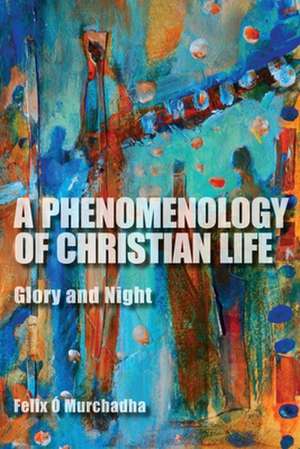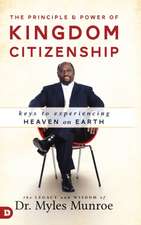A Phenomenology of Christian Life – Glory and Night
Autor Felix Ó Murchadhaen Limba Engleză Hardback – 10 sep 2013
Preț: 321.57 lei
Nou
Puncte Express: 482
Preț estimativ în valută:
61.53€ • 65.80$ • 51.30£
61.53€ • 65.80$ • 51.30£
Carte tipărită la comandă
Livrare economică 18 aprilie-02 mai
Preluare comenzi: 021 569.72.76
Specificații
ISBN-13: 9780253010001
ISBN-10: 0253010004
Pagini: 256
Dimensiuni: 160 x 235 x 24 mm
Greutate: 0.5 kg
Editura: MH – Indiana University Press
ISBN-10: 0253010004
Pagini: 256
Dimensiuni: 160 x 235 x 24 mm
Greutate: 0.5 kg
Editura: MH – Indiana University Press
Cuprins
PrefaceAcknowledgmentsIntroduction: Christianity and Philosophy1. Desire and Phenomenon2. Light and Dark3. Glory and Being4. Night, Faith, and Evil5. Incarnation and Asceticism6. Creation7. Aion, Chronos, Kairos8. Thinking Night and GloryNotesBibliographyIndex
Recenzii
"Ó Murchadha makes abundant and timely references to the philosophical tradition from Plato through Heidegger, but also, perhaps more so, to the post-Heideggerian developments sometimes considered together and at once as "the theological turn" in phenomenology. He is equally at home in the Christian theological traditions from Paul to Barth and von Balthasar." Jeffrey Bloechl, Boston College
"O Murchadha makes abundant and timely references to the philosophical tradition from Plato through Heidegger, but also, perhaps more so, to the post-Heideggerian developments sometimes considered together and at once as "the theological turn" in phenomenology. He is equally at home in the Christian theological traditions from Paul to Barth and von Balthasar." - Jeffrey Bloechl, Boston College
"O Murchadha makes abundant and timely references to the philosophical tradition from Plato through Heidegger, but also, perhaps more so, to the post-Heideggerian developments sometimes considered together and at once as "the theological turn" in phenomenology. He is equally at home in the Christian theological traditions from Paul to Barth and von Balthasar." - Jeffrey Bloechl, Boston College











